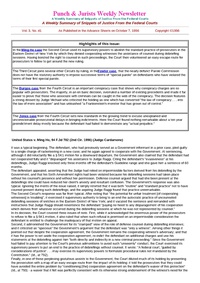Case held that "[a] survey of published cases involving § 666 indicates that courts have required that this funding be shown to exist at a fairly specific level, and not at the general governmental level." (Id., at 1542).
The Court's conclusion in this case was strongly criticized by …
Case vacated a conviction due to trial court's open hostility towards defendants, their counsel and evidence which impaired the fairness of the trial in a way that no jury instruction could have cured.
Citing its decision in U.S. v. Toney, 27 F.3d 1245 (7th Cir. 1994), the Court stated: "A defendant is entitled to a jury instruction on his theory of defense if the defendant satisfies four requirements: (1) the proposed jury instruction is a correct statement of the law; (2) the …
Although the court found that the defendant's diminished capacity, resulting from a series of disorders, would support a downward departure, it declined to grant such a departure, opting instead to remain within the heartland of the Guidelines.
Here, after noting that "the potential for unfair treatment [of cooperating witnesses] is troubling", the Court vacated a conviction because the prosecitor failed to heed prior warnings that uncounseled debriefing sessions sould cease.
It was a typical beginning. The defendant, who had previously served as a Government informant …
The principal issue in this case was the proper calculation of the losses under U.S.S.G § 2F1.1 to be used in setting the sentence of the defendant, a psychiatrist who was convicted of making false Medicare claims. Although the indictment alleged fraud of only $157,000, the Government contended that …
Here the Court observed that "the plaintiffs and their attorneys have proceeded from the outset under the assumption that [42 U.S.C. §] 1988 would apply to this case. . . . It would be 'manifestly unjust' to upset those reasonable expectations and impose new guidelines at this late date'." …
One of the issues addressed by the court in this case dealth with the use of prior uncounseled convictions to enhance a defendant's sentence. On that issue, the Court wrote: "Although a criminal defendant enjoys the right not to have a conviction obtained in violation of his right to …
Case held that the Parole Commission does not have the authority to reimpose a term of special, rather than regular parole, following revocation.
This is an important "old law" decision that deals with what Judge Sporkin once referred to as the "yo-yo sentencing practices" of the U.S. Parole …
Here, disagreeing with the Tenth Circuit's analysis in U.S. v. Galbraith, 20 F.3d 1054 (10th Cir. 1994), the Court held that loss calculations under USSG § 2F1.1 do "not require the loss the defendant intended to inflict be realistically possible." (id., at 1328). It also noted that just because …
Case noted that, although Rule 614(b) permits the court to interrogate witnesses, the court may not "convey the court's view about the merits of the party's claim.".
Case held that a prior conviction for statutory rape was not a "crime of violence" for purposes of the Federal Sentencing Guidelines; but decision was subsequently vacated by an en banc decision reported at 110 F.3d 382.
Analyzing U.S. v. Lopez, 514 U.S. 549 (1995), the Court held that it did not change the Ninth Circuit rule that the Government need only prove a de minimis effect on interstate commerce. It ruled that the Hobbs Act is concerned solely with inter state - rather than intra …
